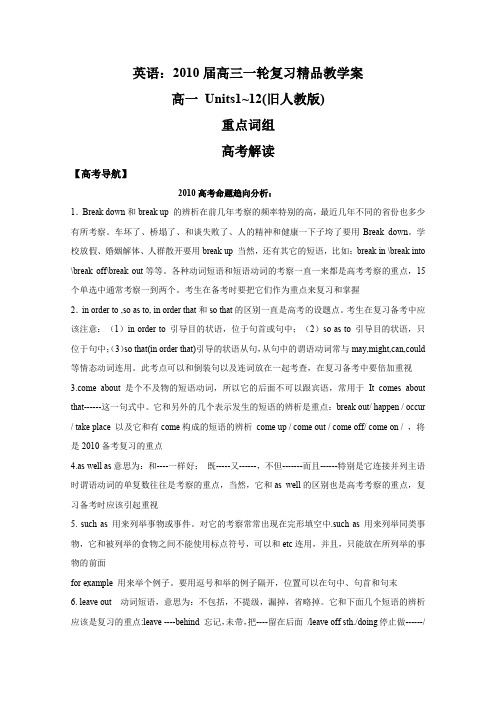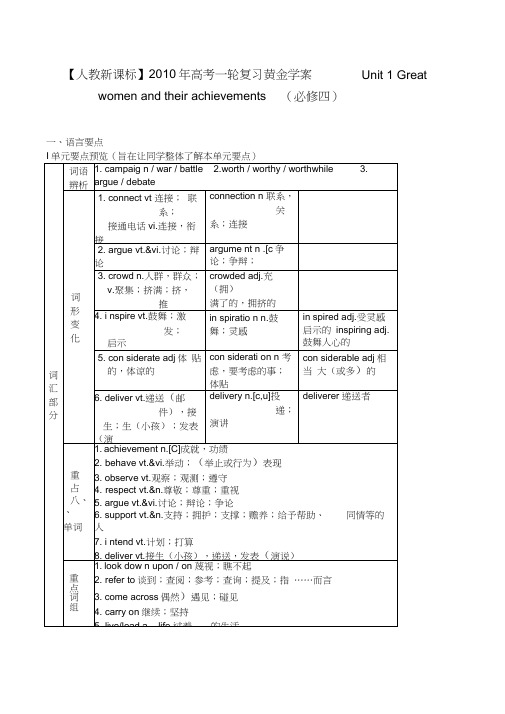2010届高考英语一轮复习精品学案――重点词语辨析900例
- 格式:doc
- 大小:382.00 KB
- 文档页数:47

一轮复习高考英语用“Mark and a Seal 马克和海豹”故事快速记词汇重点词汇解析:1. accommodation n. 住处,膳宿;调节;和解;预订铺位例句:Have you found accommodation?找到住处没有?Religions, to survive, must make accommodations with the larger political structures that nurture them.为了生存,宗教必须同其赖以存在的更大的政治体系相调和。
【和解;调和】2. pensionn. 退休金,抚恤金;津贴;膳宿费vt. 发给养老金或抚恤金常用短语:grant a pension to 给予…养老金pension fund 养老基金;退休基金pension insurance 养老保险3. shore vt. 支撑,使稳住;用支柱撑住 n. 海滨;支柱常用短语:shore up 支持,支撑;加固off shore 离开岸边;在近海处on shore 在岸上;(海员)离船in shore 靠岸lake shore 湖滨,湖岸词语辨析:这组词都有“岸”的意思,区别是:shore 指紧靠大湖泊或海洋的陆地边缘或靠海的休养地。
bank 多指有一定坡度的河岸、湖岸或堤岸。
seaside 尤指疗养地、游览地区的海边。
beach 指倾斜度小,被海、湖或河水冲刷而有沙或卵石积存的地方。
coast 地理学上的名词,专指被视为边界的沿海陆地的尽头。
4. annual adj. 年度的;每年的 n. 年刊,年鉴annual meeting 年会5. vivid adj. 生动的;鲜明的;鲜艳的vivid description 生动的描述;生动的报导vivid blue 深湖蓝; 碧蓝色6. depth n.深度;深处,深海;深奥,奥妙in depth 深入地;全面地in the depth of 在……里面例句:he country's leadership had underestimated the depth of the crisis.这个国家的领导层低估了这次危机的严重程度。

英语:2010届高三一轮复习精品教学案高一Units1~12(旧人教版)重点词组高考解读【高考导航】2010高考命题趋向分析:1.Break down和break up 的辨析在前几年考察的频率特别的高,最近几年不同的省份也多少有所考察。
车坏了、桥塌了、和谈失败了、人的精神和健康一下子垮了要用Break down。
学校放假、婚姻解体、人群散开要用break up 当然,还有其它的短语,比如:break in \break into \break off\break out等等。
各种动词短语和短语动词的考察一直一来都是高考考察的重点,15个单选中通常考察一到两个。
考生在备考时要把它们作为重点来复习和掌握2.in order to ,so as to, in order that和so that的区别一直是高考的设题点。
考生在复习备考中应该注意:(1)in order to 引导目的状语,位于句首或句中;(2)so as to 引导目的状语,只位于句中;(3)so that(in order that)引导的状语从句,从句中的谓语动词常与may,might,can,could 等情态动词连用。
此考点可以和倒装句以及连词放在一起考查,在复习备考中要倍加重视e about 是个不及物的短语动词,所以它的后面不可以跟宾语,常用于It comes about that------这一句式中。
它和另外的几个表示发生的短语的辨析是重点:break out/ happen / occur / take place 以及它和有come构成的短语的辨析come up / come out / come off/ come on / ,将是2010备考复习的重点4.as well as意思为:和----一样好;既-----又------,不但-------而且------特别是它连接并列主语时谓语动词的单复数往往是考察的重点,当然,它和as well的区别也是高考考察的重点,复习备考时应该引起重视5. such as 用来列举事物或事件。

名词1.具有某种特性、状态、特点、情感、情绪的人或事,表示变化了的词义时,这一抽象名词可作为可数名词。
(1)difficulty 困难;a difficulty 一件难事(2)experience 经验;an experience 一次经历(3)failure 失败;a failure 一位失败者,一件失败的事(4)knowledge 知识;a good knowledge 对……精通/熟知(5)success 成功;a success 一位成功者,一件成功的事(6)surprise 惊奇;a surprise 一件令人吃惊的事(7)honour 荣誉;an honour 一位(件)带来荣誉的人或事Failure is the mother of success.失败是成功之母。
The party last night was a success.We sang and danced until it came to an end.昨晚的晚会很成功,我们唱啊跳啊直到晚会结束。
Losing the game was a difficult experience for her.对她来说,输掉比赛是一种痛苦的经历。
2.有些物质名词可个体化为可数名词Would you like some coffee?你想喝点咖啡吗?I would like a coffee and two beers.我想要一杯咖啡和两杯啤酒。
物质名词可数名词物质名词可数名词drink 饮料twodrinkssugar糖a sugar一块糖两杯饮料coffee咖啡acoffee一杯咖啡paper纸a paper一张报纸;一篇论文tea 茶twoteas两杯茶hair头发a hair一根头发1.(·济宁检测)We all hold the belief that ________ London Olympic Games will be ________success.A./;a B.the;/C.the;a D.a;a解析:第一空为特指,应用定冠词the;第二空success 为抽象名词具体化,“一个成功的人或事”,应用不定冠词a,类似的词还有failure,pleasure 等。


【人教新课标】2010年高考一轮复习黄金学案Unit 1 Great women and their achievements (必修四)一、语言要点II词语辨析(旨在提供完形填空所需材料)1. campaig n / war / battle【解释】war战争”的总称,一般包括多个战役的大规模战争。
battle战斗”指有组织的武装部队之间的战斗,有持续几小时的,也有持续几天的。
campaign战役”指在某一地区所进行的一连串有固定目的的军事行动,规模比battle大;还用来表政治或商业性的活动、竞选活动” campaign for/against从事运动【练习】根据句子的意思在括号里填入适当的词。
1) . They won the ______ b ut lost the______ .2) . The city hall is pla nning to start a _____ aga inst smok ing.Keys: 1). battle; war 2). campaig n2. worth / worthy / worthwhile【解释】worth只能作表语,其后接钱数、名词或及物动词的动名词的主动一般形式:be worth doingworthy可作表语,后接of+名词/of+动名词的被动形式/不定式的被动形式:be worthy of + n./ of being done / to be done也作定语,值得..... 的” 有价值的”:a worthy winner名副其实的赢家worthwhile 可作表语和定语:a worthwhile job 值得做的工作it is worthwhile to do/do ing【练习】根据句子的意思在括号里填入适当的词。
1) . The n ecklace was ____ 100 francs at most.2) . It ' s _______to discuss the questi on aga in.3) . You would find it _____ your while to come to the meet ing.4) . Can ' t you find something ______ doing at all? The book is _________________ 很值得读)a sec ond time.5) . This place of in terest is worthy ____________________ / ____________________ / _____________________ 参观).Keys: 1). worth 2). worthwhile 3). worth 4). worth; well worthread ing5). of a visit / of being visited / to be visited3. argue / debate【解释】argue指某人坚持自己的主张,举出事实和理由说服某人或反对其他方面的意III词性变化(旨在提供语法填空所需材料)IV重点词汇(旨在提供综合运用所需材料)1. b ehave vt.&vi.举动;(举止或行为)表现behavio(u)r n.行为;举止;习惯[典例]1). Behave yourself; don ' t make a fool of y注意你的举止,别闹出笑话来。

2010届高考英语一轮复习精品学案――重点词语辨析900例1.accuse / chargeaccuse 和charge 都有“指责,控告”之意,有时可通用,但结构不一样。
accuse 不一定针对重大过失或罪行,其结构为accuse sb of sth 。
而charge 一般用于重大过失或罪行,其结构为charge sb with sth ,此结构还有“使某人负有……责任”之意。
例如:例1:My father accused me of my being too careless. (父亲责备我太粗心。
)例2:He accused me of neglecting my duty. (他指控我玩忽职守。
)例3:He charged me with neglecting my duty. (同上)例4:Jimmy was charged with murder. (吉米被控谋杀。
)例5:He was charged with an important task. (他担负有一项重要任务。
)2.add / add to / add up / add up toadd :增加,把……加上。
add …to …:把……加到。
例如:例6:At the end of the party, we added another program.例7:You needn’t add any water to the medicine.add to :增添。
指增添喜悦、悲伤、麻烦等。
例如:例8:His coming added to our trouble. (他的到来给我们添了麻烦。
)add up :加起来。
例如:例9:Have you added up all the numbers?add up to :总计。
表示加起来的结果,无被动结构。
例如:例10:All the numbers added up to 100.3.advise / suggestadvise :建议,劝说。
例如:例11:I advised (his) trying again. (= suggest)例12:I advised that we (should) try again. (= suggest ,虚拟语气。
)例13:I advised him to give up smoking.例14:I advised him not to smoke.例15:Could you advise us on how to learn English?例16:Could you give us some advice on how to learn English?suggest :建议,表明,暗示。
例如:例17:We suggest having a meeting at once. (= advise)例18:We suggest that a meeting (should) be held at once. (= advise ,虚拟语气。
)例19:His pale face suggests that he is in poor health. (他那苍白的脸色表明他身体欠佳。
)4.agree with / agree to / agree onagree with :同意,赞成(后接“人”或what 从句作宾语);适合,适应;一致。
例如:一一、、动动词词例20:I don’t quite agree with you.例21:Nobody agreed with what he had said at the meeting.例22:The weather here doesn’t agree with most of us. (这里的天气我们多数人不适应。
)例23:Your words do not agree with your actions. (你的言行不一。
)agree to:同意,赞成。
指一方同意另一方的意见、建议、观点、想法等。
例如:例24:John can’t agree to Joe’s idea.agree on:对……达成共识。
指双方或多方对某事取得一致意见。
例如:例25:Finally John and Joe agreed on the plan.5.allow / permit / let / promiseallow:允许,许可。
指听任或默许,也可用来表示客气的请求。
例如:例26:Who allowed you to leave the camp?例27:Smoking is not allowed here.例28:Please allow me to introduce myself to you.permit:允许,许可。
通常指正式的许可。
例如:例29:He declared that he would permit me to do so.allow 和permit 的含义虽然有所差别,但实际运用中两者常通用。
let:允许,让。
其后的宾语补足语应是不带to的不定式。
一般不用于被动语态。
例如:例30:Don’t let this happen again.例31:This is not allowed to happen again. (不说:This is not let to happen again.)promise:答应,允诺。
用于主动答应自己要做什么的场合。
例如:例32:They promised an immediate reply.例33:He promised to start at once.例34:I promised him to see to the matter right away.(我答应他马上处理这件事。
不定式to see to 是主语I发出的。
)6.announce / declareannounce:宣布,宣告。
常指首次公开或正式宣布人们关心的某件事情。
例如:例35:The government announced that the danger was past.例36:It was announced that the national science conference would soon be held in Beijing.另外,要表达“向某人宣布某事”,应用announce to sb sth。
后接to sb的动词还有say,explain等。
例如:例37:He announced to us the news and then said to us, “Now let me explain to you in details.”(他向我们宣布了这个消息,然后对我们说:“现在让我详细给你们解释吧。
”)declare:宣布,声明。
指以正式的话语公开宣布某件事。
例如:例38:The chairman declared the exhibition open. (主席宣布展览会开幕。
)7.answer / replyanswer:回答,回应。
例如:例39:“Tom!” No one answered.例40:Please answer the door-bell. (请去开门。
)例41:He answered that he knew nothing about it.例42:No one was able to answer him a word.reply:回答,答复。
作不及物动词时,后需接to再接宾语;作及物动词时,后直接接that从句或what从句,或用于倒装句。
例如:例43:He replied to me, “I need the answer to the exercise.”例44:He replied that he would not go.例45:Not a word did she reply.(她一句话也不应。
)answer当名词用时,与reply一样,要接to。
例如:例46:He made no answer / reply to his questions.8.appear / look / seemappear:显得,好像。
有时含有表面上显得,而事实未必的意味。
例如:例47:This kind of apples appears good, but in fact it tastes sour.(这种苹果看起来好,实际吃起来酸。
)seem:好像。
暗示判断有一定根据,往往接近事实。
例如:例48:You seem to have made the same mistake again this time.(你这次似乎又犯了同样的错误。
)例49:It seems that it is going to rain soon.look:好像。
表示凭感觉作出的判断。
例如:例50:What’s wrong with you? You look pale.例51:It looks like rain. (看来要下雨了。
)9.argue / quarrelargue:辩论,争论。
指提出理由或论据以支持或反驳某种意见或主张,着重说理。
如:例52:What are you arguing about?例53:I argued with him the whole day.quarrel:争论,争吵,吵架。
例如:例54:It’s unwise to quarrel with your boss about that. (为那件事同你老板争吵是不明智的。
)10.arrive / reach / getarrive,reach和get都有“到达”的意思。
arrive通常与介词at或in连用,它和reach是比较正式的用语;reach是及物动词;get通常与介词to连用,在口语中常用。
arrive和get后接副词(如here, there, home 等)时,不用介词。
reach和arrive at还有“达成(协议),作出(决定)”的意思。
例如:例55:When we arrived at the station, the train had left.例56:At five, they arrived in Beijing.例57:The letter didn’t reach me until yesterday.例58:At what time did you get to the post office?例59:The two sides failed to reach / arrive at an agreement after several hours’ discussion.(几个小时的讨论后,双方还是没能达成一致意见。